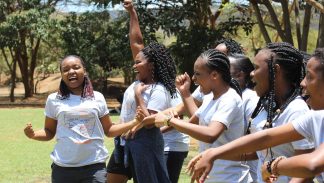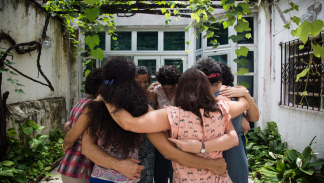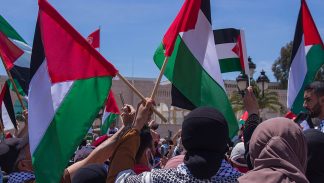From Orlando to Pakistan: LGBT violence around the world
Yesterday, news broke about the latest devastating instance of violence against lesbian, gay, bisexual, and transgender people: 49 people were killed and 53 more injured in a horrific shooting in a gay nightclub in Orlando, Florida. The deadly mass shooting was an unacceptable hate crime and one of many, mounting instances of violence against LGBT people around the world in recent months.
Across the globe, people are being killed for being lesbian, gay, bisexual, transgender, queer, intersex, or non-conforming. And violence is especially prevalent against those who are activists for the LGBT community and standing publicly for equal human rights, and an end to the violence.
Twenty-three-year-old Pakistani transgender activist Alisha is just one recent and shocking example. She was shot nine times on May 23rd. She died last week because medical staff at one of the largest medical facilities in the northern Khyber Pakhtunkhwa province, Lady Reading Hospital, refused to provide medical attention and delayed treatment for more than 17 hours while they debated whether or not to place her in the ward for male or female patients.
Qamar Naseem, a gender equality and LGBT activist in Pakistan who is Program Coordinator of Blue Veins Pakistan—Global Fund for Women’s grantee partner working to advance gender equality and empower women— and who worked with Alisha in the TransAction Alliance in Khyber Pakhtunkhwa, shared the devastating details of Alisha’s murder:
Alisha was shot nine times from point blank. They raped her, they filmed her rape, and then they shot her. When we took her to the hospital, the hospital denied to admit her because she was a transgender woman and they didn’t know whether she would go to a male ward or to a female ward. And so much time was wasted just because of this debate.
Nobody was letting her in the ward. This was not only the administration – the patients’ attitude was also a contributing factor because there were men who did not want her in the same ward as them, and then there were women who did not want her in the same ward as them because they saw her as a different species.
They didn’t understand that she was human. They were just looking at it through the so-called definition of man and woman, and she does not fit in that.
She kept on bleeding and was without any medical attention for more than 17 hours. No one came near her while many others in the transgender community were crying for help. Then [when she finally received care] she was operated on outside of a bathroom in very unsanitary conditions.
This was not only the death of Alisha, this was the death of humanity as well.
This was the third time in Alisha’s 23 years that she had been shot. Naseem described the group that raped and shot her as “an organized criminal gang which is involved in the commercial and sexual exploitation of transgender women”. Still, the most devastating fact for her colleagues and friends is that she could have survived the attack with proper and timely medical attention.
LGBT violence and stigma in northwestern Pakistan
Naseem and TransAction Alliance Khyber Pakhtunkhwa—an alliance of gender equality and transgender activists where Alisha was a board member and frequent leader of demonstrations—say that Alisha’s death illuminates the larger issue of violence against LGBT people. They point to militarism and fundamentalism in northwestern Pakistan, where Khyber Pakhtunkhwa is, as a key factor in this trend, highlighting the ongoing conflict as well as recent extremist attacks like an attack at Bacha Khan University in January that killed 20 people.
“Alisha was the fifth [Board Member] who came under attack within a six-month period,” explains Qamar Naseem, sharing that TransAction Alliance is planning to release data on transgender violence in July. “46 transgender people along with Alisha have been killed since January 2015, and there are more than 300 violence cases against transgender people in Khyber Pakhtunkhwa only.”
Reflecting on this violence, Naseem also was quick to recognize that solidarity and support from others has been very meaningful. There have also been some significant steps forward in terms of policy that the Alliance believes can help prevent another brutal death like Alisha’s.
“For the first time in the history of Pakistan, there will be government development schemes for the transgender community in Khyber Pakhtunkhwa,” Naseem explained. “The government has announced that there will be separate wards in hospitals for the transgender community. This access to health care as well as to housing and protection in the new policy, we see as a great achievement for the Alliance.”
A global problem
Violence, threats, and discrimination against LGBT people around the world like Alisha and those at Pulse nightclub in Orlando on Saturday night, take many ugly forms.
Global Fund for Women’s partners in Uganda point to frequent cases of violence like the recent rape of a lesbian, the arrest of two gay men to be forced to undergo an examination to prove their homosexuality, and recent evictions of transgender people from their homes.
“It continues to be dangerous to live in Africa as an LGBT person, especially for people who are living in slums,” explains Ssenfuka Joanita Warry, Executive Director of Freedom and Roam Uganda, which works to advance the human rights of LGBT people in Uganda. “They continuously get threats from their communities.”
Violence against LGBT communities is also an increasing problem in eastern Europe. In February, two transgender women were murdered in one week. Angela Likina, a transgender woman and activist, was attacked by a group of men and stabbed to death in Ufa, Russia. In Georgia, Bianka, a transgender woman and activist, was found dead in her apartment. Her death is under police investigation—Global Fund for Women’s partners believe it was murder based on her advocacy against Georgia’s treatment of transgender women.
Why we must continue Alisha’s fight for human rights
In all of its ugly forms, discrimination and violence against anyone because of their gender identity, sexuality, or preferred sexuality or gender—or gender non-conformity—is a violation of human rights.
The deaths and the discrimination must stop—in the U.S., in Pakistan, and all over the world.
We must stand in solidarity with bold activists around the world working to advance equality, end discrimination, and prevent anti-LGBT violence once and for all.
Photo credit: Alissa Everett for #DETERMINED.
This was not only the death of Alisha, this was the death of humanity as well."Qamar Naseem


